
 |
||||||||
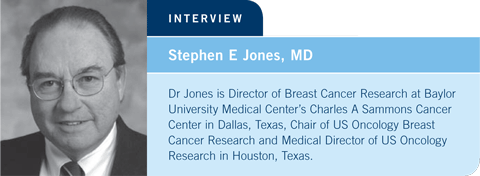
| Tracks 1-16 | ||||||||||||||||||||||||||||||||||
|
Select Excerpts from the Interview
Tracks 1-3
![]() DR LOVE: How have you responded to feedback you have received on
the US Oncology adjuvant trial evaluating TC versus AC?
DR LOVE: How have you responded to feedback you have received on
the US Oncology adjuvant trial evaluating TC versus AC?
![]() DR JONES: We attempted to address some of the criticisms in our updated
San Antonio report of the TC versus AC trial (Jones 2007), although some of
the concerns are not “fixable.” One criticism was that it’s a small trial, which
is true in that it involved 1,016 women. Another criticism was the lack of a
cardiac monitoring plan, but 10 years ago I don’t believe anyone was aware
of the cardiotoxicity associated with AC. Likewise, we were not routinely assessing HER2 status when patients were accrued to the trial. We were able
to go back and collect tumor blocks from 170 patients, or 17 percent of the
study population, and perform FISH on those tumors.
DR JONES: We attempted to address some of the criticisms in our updated
San Antonio report of the TC versus AC trial (Jones 2007), although some of
the concerns are not “fixable.” One criticism was that it’s a small trial, which
is true in that it involved 1,016 women. Another criticism was the lack of a
cardiac monitoring plan, but 10 years ago I don’t believe anyone was aware
of the cardiotoxicity associated with AC. Likewise, we were not routinely assessing HER2 status when patients were accrued to the trial. We were able
to go back and collect tumor blocks from 170 patients, or 17 percent of the
study population, and perform FISH on those tumors.
The final criticism was that no survival difference existed between TC and AC. However, now with a seven-year median follow-up, the absolute survival difference is five percent — 87 versus 82 percent — and the hazard ratio is 0.69, which indicates that the chance of dying with TC is 31 percent less than with AC (Jones 2007; [1.1]).

Track 3
![]() DR LOVE: What about adverse events?
DR LOVE: What about adverse events?
![]() DR JONES: We examined our database for long-term potential toxicities and
identified three fatal events: congestive heart failure in a woman younger than
age 50, myelodysplastic syndrome and myelofibrosis. Those three patients
received AC chemotherapy, and we saw nothing similar in the TC arm.
DR JONES: We examined our database for long-term potential toxicities and
identified three fatal events: congestive heart failure in a woman younger than
age 50, myelodysplastic syndrome and myelofibrosis. Those three patients
received AC chemotherapy, and we saw nothing similar in the TC arm.
These are the concerns with anthracyclines. They adversely affect the heart, a fact that has been underappreciated. We are beginning to understand this effect of anthracyclines better, particularly in older patients. Data from MD Anderson and the SEER and Medicare database demonstrate that the occurrence of congestive heart failure may be in excess of 10 or 20 percent among women older than 65 years when treated with anthracyclines (Pinder 2007; [1.2]).
That’s scary, and I wonder, did I contribute to this? It would be nice to have a treatment that eliminated doxorubicin, which may be responsible for some of the late congestive heart failures. The anthracyclines also increase nausea and vomiting. In our original report, significantly less Grade III/IV nausea and vomiting was recorded with TC versus AC, and more antiemetics had to be used for those patients with delayed nausea and vomiting ( Jones 2005, 2006).
Track 5
![]() DR LOVE: Did you observe any differences in how older patients
responded to TC versus AC?
DR LOVE: Did you observe any differences in how older patients
responded to TC versus AC?
![]() DR JONES: Hy Muss was helpful in the analysis of our data with the
elderly. We selected the 16 percent of women who were aged 65 and older
when entering the trial. TC was a tolerable treatment in that group. The
elderly patients experienced slightly more toxicity, but not much. The older
patients treated with TC had better outcomes than those treated with AC
( Jones 2007; [1.3]).
DR JONES: Hy Muss was helpful in the analysis of our data with the
elderly. We selected the 16 percent of women who were aged 65 and older
when entering the trial. TC was a tolerable treatment in that group. The
elderly patients experienced slightly more toxicity, but not much. The older
patients treated with TC had better outcomes than those treated with AC
( Jones 2007; [1.3]).
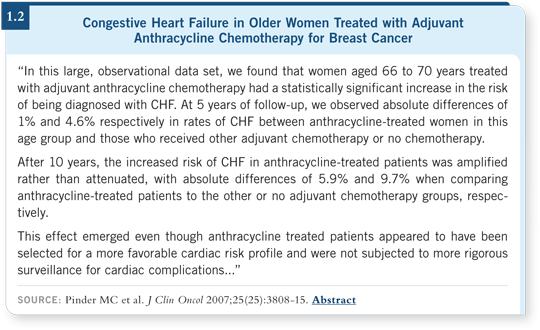
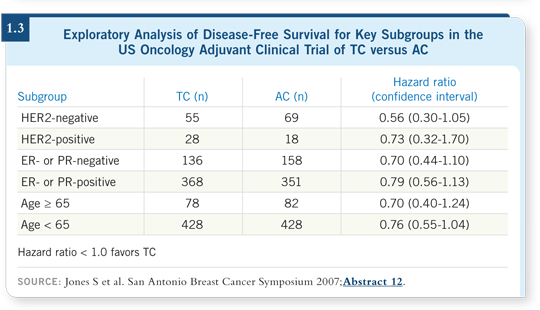
Tracks 6-7
![]() DR LOVE: What is the rationale for your new US Oncology adjuvant trial
for patients with HER2-negative breast cancer (1.4)?
DR LOVE: What is the rationale for your new US Oncology adjuvant trial
for patients with HER2-negative breast cancer (1.4)?
![]() DR JONES: If all the patients who overexpress HER2 are removed from the
population, then virtually no patients with TOPO II amplification remain.
That is the basis of our current trial, in which we will attempt to prove that
adjuvant anthracyclines are unnecessary.
DR JONES: If all the patients who overexpress HER2 are removed from the
population, then virtually no patients with TOPO II amplification remain.
That is the basis of our current trial, in which we will attempt to prove that
adjuvant anthracyclines are unnecessary.
We will be comparing six cycles of TC to six cycles of TAC for patients with HER2-negative early breast cancer. The supposition is that no target for doxorubicin exists in this population. We are collecting tumor blocks and will test them for overexpression of TOPO II and TOPO II protein expression because some controversy remains over the idea that TOPO II protein expression and gene expression are not the same.
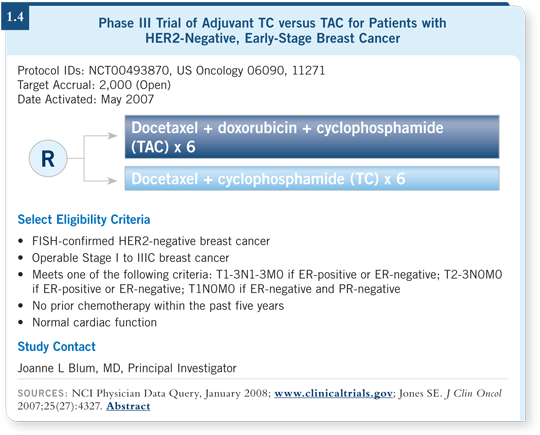
Track 8
![]() DR LOVE: Can you discuss the other US Oncology adjuvant trial that
was recently launched for patients with HER2-positive tumors (1.5)?
DR LOVE: Can you discuss the other US Oncology adjuvant trial that
was recently launched for patients with HER2-positive tumors (1.5)?
![]() DR JONES: We are conducting a Phase II pilot study for safety and toxicity.
We will try to use data from other trials to obtain a reference point for
efficacy, but it’s not an efficacy trial.
DR JONES: We are conducting a Phase II pilot study for safety and toxicity.
We will try to use data from other trials to obtain a reference point for
efficacy, but it’s not an efficacy trial.
The regimen being evaluated is docetaxel/cyclophosphamide with trastuzumab. Trastuzumab will be administered for one year — weekly during the four cycles of TC, then every three weeks thereafter.
We haven’t encountered any unusual problems with the regimen, and I’ve spoken to oncologists around the country who are using this treatment off label. They decide a patient with HER2-positive breast cancer needs some, but not too much, chemotherapy, and four cycles of TC combined with trastuzumab seems reasonable.
![]() DR LOVE: Once the safety is established, do you expect physicians will start
using the regimen, or would they require a Phase III study comparing it to
docetaxel/carboplatin with trastuzumab (TCH), for example?
DR LOVE: Once the safety is established, do you expect physicians will start
using the regimen, or would they require a Phase III study comparing it to
docetaxel/carboplatin with trastuzumab (TCH), for example?
![]() DR JONES: I believe physicians will recognize that docetaxel/cyclophosphamide/trastuzumab is safe and reasonable and will use it only for selected
patients — those with node-negative disease or with one or two positive
nodes. If physicians are uncomfortable with this, the other options are six
cycles of TCH or eight cycles of AC
DR JONES: I believe physicians will recognize that docetaxel/cyclophosphamide/trastuzumab is safe and reasonable and will use it only for selected
patients — those with node-negative disease or with one or two positive
nodes. If physicians are uncomfortable with this, the other options are six
cycles of TCH or eight cycles of AC![]() TH with its associated cardiotoxicity.
TH with its associated cardiotoxicity.
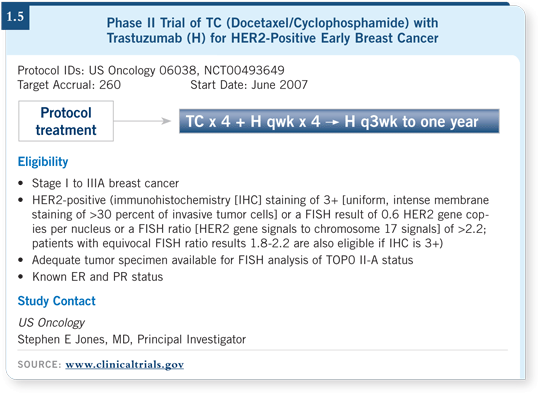
Track 9
![]() DR LOVE: Do you have patients — perhaps older or frail women — for
whom you would consider adjuvant trastuzumab without chemotherapy?
DR LOVE: Do you have patients — perhaps older or frail women — for
whom you would consider adjuvant trastuzumab without chemotherapy?
![]() DR JONES: That issue does come up, and it makes sense, particularly for a
woman with hormone receptor-positive breast cancer with whom you are
planning to use an aromatase inhibitor.
DR JONES: That issue does come up, and it makes sense, particularly for a
woman with hormone receptor-positive breast cancer with whom you are
planning to use an aromatase inhibitor.
Although data from the TAnDEM trial of anastrozole with or without trastuzumab for patients with hormone receptor-positive, HER2-positive metastatic breast cancer were disappointing (Mackey 2006), they are open to interpretation. Most patients with HER2-positive tumors tend to express ER at lower levels. These are not patients who we expect to respond well to endocrine therapy.
My interpretation is that approximately 20 percent of patients fared well, even at three years, and were still responding to both the aromatase inhibitor and trastuzumab. That subpopulation of patients with relatively indolent, HER2-overexpressing — probably ER-positive and PR-positive — breast cancer may fare well. Having said that, some older women coming in will refuse chemotherapy. In those instances you have to consider trastuzumab.
Track 14
![]() DR LOVE: Prior to the results of the E2100 study, many physicians were
using capecitabine as first-line therapy. Can you comment on the current
use of capecitabine in metastatic disease?
DR LOVE: Prior to the results of the E2100 study, many physicians were
using capecitabine as first-line therapy. Can you comment on the current
use of capecitabine in metastatic disease?
![]() DR JONES: Capecitabine has become a useful drug as physicians have learned
how to use it and have found ways to decrease its toxicity by modifying schedules.
It is well tolerated and active. Over the years, capecitabine has undergone
a major shift in opinion by oncologists. At first we saw a lot of opposition, as
it was viewed as being extremely toxic. Now it is thought of as one of the best
drugs to use because it is so patient friendly.
DR JONES: Capecitabine has become a useful drug as physicians have learned
how to use it and have found ways to decrease its toxicity by modifying schedules.
It is well tolerated and active. Over the years, capecitabine has undergone
a major shift in opinion by oncologists. At first we saw a lot of opposition, as
it was viewed as being extremely toxic. Now it is thought of as one of the best
drugs to use because it is so patient friendly.
EDITOR'S NOTE
San Antonio adventure, 2007
Neil Love, MD
- Select publications
INTERVIEWS
Stephen E Jones, MD
- Select publications
Sir Richard Peto, FRS
- Select publications
Kathy S Albain, MD
- Select publications
Roundtable Discussion
- Select publications
Joyce O’Shaughnessy, MD
- Select publications
Nancy U Lin, MD
- Select publications
Breast Cancer Update:
A CME Audio Series and Activity